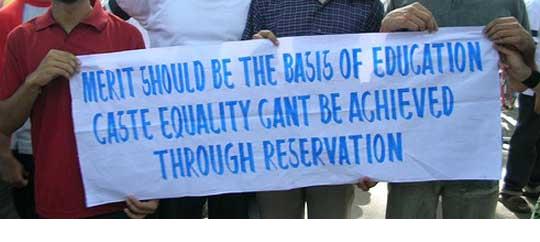
It is not that BJP’s clarification on the controversy comes as a surprise. In fact, it was done expeditiously keeping in mind the Bihar polls where janata has historically voted its caste. The only thing that was missing from the clarification was a small addendum. Something like “However, the government is open to exploring all options to make the reservation policy stronger by bringing all vulnerable sections of the society in its ambit, taking into confidence all political parties and various sections of the society”. Not to say, that the government cannot attempt to tweak the policy today, but the categorical refusal of the BJP in even considering the possibility of revision of the Reservation policy somewhat hurts a section of hardcore BJP supporters, who have tended to look at this policy with disdain. The Mandalization of Indian politics and the cartelization of vote banks means that any talk of revisiting Reservation policy might invite swift electoral retribution, and that is precisely what is scary about the policy- it is monolithic and unchangeable.
The makers of the constitution had not and did not want an unending policy of state patronage for the weaker sections. In fact, before the much maligned Mandal reforms, the constitution provided affirmative action for the so called Scheduled castes and tribes, upto 22.5%, subject to periodic review. The Mandal commission, set up by the Janata Party government, recommended the addition of the so called Other Backward Castes, adding another 27% reservation, thereby bringing the total reservation percentage to 49.5%. This report was implemented by VP Singh in 1990. The Supreme Court has ruled that reservations cannot exceed 50%, though in states such as Tamil Nadu, 69% of the seats stand reserved. The emergence of Mandal politics and establishment of strong vote banks by Laloo, Mulayam, Mayawati et al has meant that the extension of the reservation policy now happens pretty much automatically. Sadly, it is the one point that unites all our political parties.
There had been strong protests when the Mandal commission reports had been accepted. Massive student protests, dharnas, bandhs and cases of self immolation were reported from far and wide. Indian economy then, unlike now, had limited employment opportunities and that too mostly in the public sector, which the protesters, rightly felt were being denied to them. In spite of the scale of protests, none of the mainstream political parties extended their support to the protesters. The protests, on the other hand, galvanized the backward communities, who banded together under the likes of Laloo, Mulayam and Paswan and began to make their political presence felt. There was an anti-reservation redux in 2006, when the UPA government extended reservation to higher educational institutes. Movements such as Youth for Equality, emerged and ultimately fizzled out with the lack of political support. Interestingly, the 2006 constitutional amendment was passed with almost 100% support (2 members abstained) in the Lok Sabha.
The need for reviewing reservation policy stems from two grounds-
1. In today’s times, it is economic status rather than caste, which is primary determinant of need for state patronage
2. Reservation policy is opposed to the concept of meritocracy
In this light, BJP’s categorical refusal to initiate a debate on the reservation policy is a big let down. However, soon after this controversy, Rajasthan government passed 2 bills, one of which, reserved seats for the economically backward communities. It is unlikely that the law will ultimately prevail as it takes the percentage of reserved seats in Rajasthan to 68%. However, it is good to see some steps for extending benefits to the economically deprived irrespective of their castes. One of the drawbacks of the curent reservation policy is that it has consolidated castes instead of dissolving them. Hence the demand for reservation by Gurjars, Patels and other communities.
In the short term, it seems unlikely that the present reservation policy would go away. In this situation, the way forward is to continue the growth and consolidation of private sector, where these rules don’t apply, and eventually render the reservation policy meaningless. The other solution could be in the form of intervention by the Supreme Court that does away with this policy
In a country like ours, where political will seldom matches public expectations, that seems the only way.
